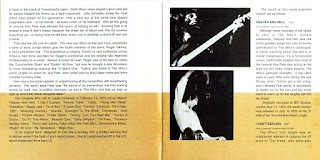Live at Leeds is the first live album by the English rock band The Who. It was recorded at the University Refectory, University of Leeds on 14 February 1970, and is the only live album that was released while the group were still actively recording and performing with their best known line-up of Roger Daltrey, Pete Townshend, John Entwistle and Keith Moon. Initially released in the United States on 16 May, by Decca and MCA and the United Kingdom on 23 May, by Track and Polydor, the album has been reissued on several occasions and in several different formats. Since its release, Live at Leeds has been cited by several music critics as the best live rock recording of all time.
The cover was designed by Beadrall Sutcliffe and resembled that of a bootleg LP of the era, parodying the Rolling Stones' Live'r Than You'll Ever Be. It contains plain brown cardboard with "The Who Live At Leeds" printed on it in plain blue or red block letters as if stamped on with ink (on the original first English pressing of 300, this stamp is black). The original cover opened out, gatefold-style, and had a pocket on either side of the interior, with the record in a paper sleeve on one side and 12 facsimiles of various memorabilia on the other, including a photo of the band from the My Generation photoshoot in March 1965, handwritten lyrics to the "Listening to You" chorus from Tommy, the typewritten lyrics to "My Generation", with hand written notes, a receipt for smoke bombs, a rejection letter from EMI, and the early black "Maximum R&B" poster showing Pete Townshend wind-milling his Rickenbacker. The first 500 copies included a copy of the contract for The Who to play at the Woodstock Festival.
The label was handwritten (reportedly by Townshend), and included instructions to the engineers not to attempt to remove any crackling noise. This is probably a reference to the clicking and popping on the pre-remastered version (notably in "Shakin' All Over") which was from John Entwistle's bass cable. Modern digital remastering techniques allowed this to be removed, and also allowed some of the worst-affected tracks from the gig to be used; on CD releases, the label reads, "Crackling noises have been corrected!"


















No hay comentarios.:
Publicar un comentario